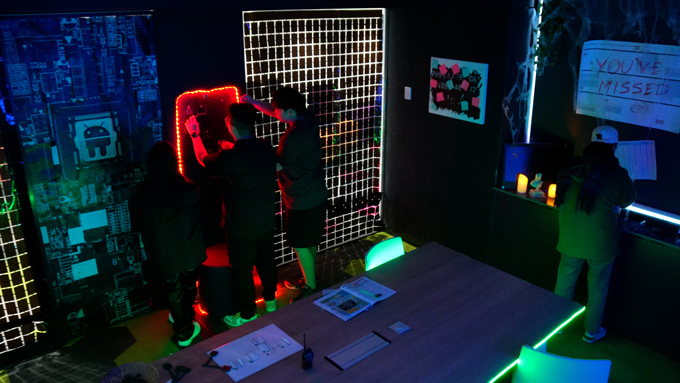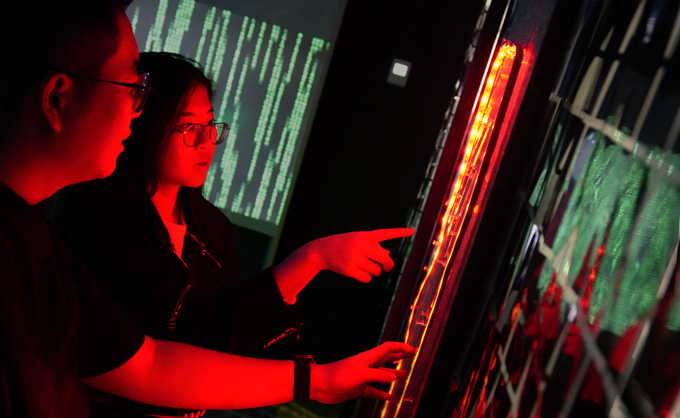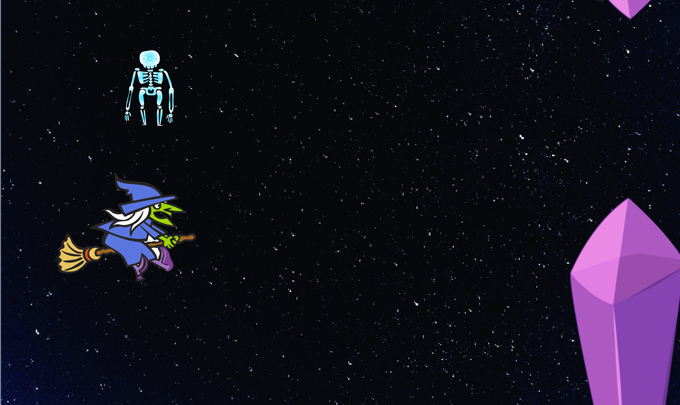The original Escape Room, unveiled in 2022, invited School of Computing students to be locked inside, with riddles and puzzles to solve if they wished to regain their freedom. Earlier this year, the project received a $65,000 Strategic Learning and Teaching Grant to facilitate the creation of new escape rooms across the Australian National University (ANU).

And last week, the Escape Room’s principle designer, Dr Bernardo Pereira Nunes, received a 2023 Vice-Chancellor’s Award for Excellence in Education for a “teaching philosophy centred on active methodologies, focusing on innovation, quality and social impact”.
“My goal as an educator is to demystify computer science using multiple teaching methodologies and, more importantly, to listen to my students and consider their needs and differences,” Dr Pereira Nunes said. “By embedding them in holistic experiences, I aim to cultivate a generation of learners who are not just knowledgeable, but who are also dynamic, reflective, collaborative and ready to contribute proactively to their academic pursuits and societal needs.”
Making abstract concepts easier to grasp
Computer science is filled with complex concepts that are intangible and hard to visualise, presenting a hurdle for teachers and learners alike.
“Algorithms are basically a series of steps to solve a problem, but these steps may not have a direct real-world counterpart to which students can easily relate,” Dr Pereira Nunes said. “And understanding computer programming involves multiple levels of abstraction.”
As a computer science educator, Dr Pereira Nunes has long believed that students learn and retain more when they are enjoying themselves, as opposed to sitting in a lecture or studying for an exam.
“Teaching computer science requires analogies to reduce the cognitive load on our students,” Dr Pereira Nunes said.

That was the goal when he incorporated the Escape Room into his teaching last year. Students were invited to engage with puzzle pieces and other objects as analogies for abstract concepts. The Escape Room was optional; not required as part of the course, and the results would not be marked.
But the students did not require such incentives. They were motivated by the challenge and determined to solve all the puzzles and “escape” the room. Later, they reported that they enjoyed the experience so much that they forgot they were learning.
Dr Pereira Nunes had built into the activity a methodology for teaching “soft skills”—critical thinking, creative thinking, communication, etc.–in addition to “hard” computer science skills. Success in this regard led to the idea of expanding the approach beyond the College of Engineering, Computing & Cybernetics (CECC).
Escape Rooms can be customised to teach concepts specific to any domain of expertise. In the Escape Room’s second incarnation, its software was adapted with new puzzles that teach epidemiology instead of computing.

Whatever the subject matter, Escape Rooms encourage participants to approach problems systematically, think creatively, work collaboratively, and develop leadership skills. The “soft” skill interactions among peers, as well as the hard skill answers to the riddles and puzzles, are evaluated and discussed afterward.
Dr Pereira Nunes said that when the software requires 3 puzzles to be solved in sequence, participants are encouraged to work in collaborative teams, exchange perspectives, and engage in critical and creative thinking.
To solve 5 difficult puzzles simultaneously and with a time constraint, participants often split up into teams. Leaders emerge, implementing delegation and time management skills while simulating the pressure cooker of a real-world work environment.
Dr Pereira Nunes said that “soft” skills are often overlooked in computer science and other science degrees, but they are sought after in the tech industry as much, if not more in than “hard” skills like coding.
Shooting through the sky, to the back of beyond
The Escape Room is not the only innovative teaching tool Dr Pereira Nunes has up his sleeve.
When high schoolers visit the ANU campus on 8 November, Dr Pereira Nunes will greet them with a lecture and learning exercise where students must act out the different parts of a computer program that governs a video game.
“I think it is a more meaningful way of learning coding than saying, ‘this is a variable, this is a condition’,” Dr Pereira Nunes said. “Instead of just words, we have a student acting out a condition, acting out a variable. When they have an input, what is the output defined by the condition? Then we add loops and procedures. In this way, we start with things they know and then go to the abstract.”

The video game, which is based on the FlappyBird video game, involves a witch riding a broomstick through various obstacles.
“A computer is always listening. You have to give it very specific instructions, or it will not give you the outcome you expect. And, there are lots of different processes running in parallel,” Dr Pereira Nunes said. “What I want to do in this lecture for high school students is help them to think algorithmically, to think in computational ways.”
Dr Pereira Nunes said that his methodology begins with listening to students. He might like video games, but if it turned out that his students did not like them, he would find out what they do like, and create the best environment for them to learn.
“I’m trying to understand their needs and then create a pedagogy that meets their needs,” he said.
Educators rack up grants, teaching awards
Dr Nicolò Malagutti also received a 2023 Vice-Chancellor’s Award for Excellence in Education in recognition for his “revitalised” Engineering curricula over the past 10 years “spanning foundational, advanced and project-based courses”. And a teaching team that included Dr Malagutti won an Vice-Chancellor’s Award for Programs That Advance Learning for the Systems Engineering Core, a future-fitted undergraduate program that is unique in Australia.
In addition to Dr Pereira Nunes, two CECC educators received Strategic Learning and Teaching Grants: Dr Jeremy Smith (also part of the Systems Engineering team) for “Embedding Indigenous Perspectives in Engineering”, and Dr Penny Kyburz for “Exploring Pathways for Cultivating Entrepreneurship at ANU.”
And Dr Kyburz and Dr Smith are project members on another Teaching Grant winner, the “Social Impact Studio”.
The awards and grants are designed “to accelerate the University’s program of educational renewal” and “deliver a student experience equal to the world’s best”.
The Escape Room hub will be designed in collaboration with academics from other Colleges including Dr Thiago da Silva of the College of Arts and Social Science, Ms Guddu Kaur and Ms Amy Villarosa from the College of Health and Medicine, and Ms Bruna Contro Pretero of Information Technology Services.
“The grant allows us to create an Escape Room Hub which will help other educators design their own escape rooms, focusing on first year courses,” Dr Pereira Nunes said. “We will also create a community of practice and develop frameworks and guidelines on how to integrate escape rooms into various teaching programs.”
Dr Pereira Nunes serves on the committee but did not participate in the evaluation process for the Strategic Learning and Teaching Grant program.
More about Dr Pereira Nunes and the Escape Room:
Escape Room unlocks inventive path to learning (October 2022)
Escape Room opens doors to public (March 2023)
The power of AI in education (May 2023)

